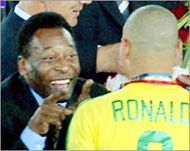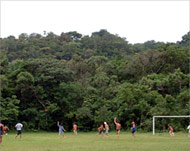Football: A Brazilian love affair
In Sao Paulo you did not have to watch a TV to know the score in the Brazil v Argentina World Cup qualifier match.

The sky exploded with fireworks above the city every time the ball hit the back of the net.
It is the start of winter but Brazilians will be walking in sunshine for weeks following their 3-1 victory. The national side winning is one thing – beating Argentina is another.
Pele or Diego Maradona – the argument rages as to who was the greatest footballer of all time.
Brazil and Argentina, with seven World Cup titles between them command the attention of the football world. One or the other has taken to the field in each of the last five World Cup finals.
According to the Brazilian Football Confederation, historically that makes it 34 wins to Argentina’s 33 in all competitive encounters. Unsurprisingly, even this fact is disputed.
“The only team Argentina hate as much as Brazil is England. When they played each other in the 2002 World Cup the headline in the newspaper here was ‘Let’s hope for an earthquake!'” says Sofi Botana, swathed in the blue and white flag.
Security worries
The occasion is always fiery. The Minerao stadium, holding 42,000 fans, was checked for bombs, patrolled by the army with sniffer dogs and watched over by a bank of security cameras.
Both countries have suffered from recent hooligan problems.
 |
|
The giant Minerao stadium is now |
Daniel Cardoso, 16, was kicked to death in a derby match between Sao Paulo’s biggest rivals Corinthians and Palmeiras last month.
“One more death of a supporter at the hands of organised football violence. It’s a really old problem without a solution,” says Juca Kfouri, a columnist with the leading daily sports newspaper, Lance.
The giant stadiums, built for the 1950 World Cup, are virtually empty for most league matches. Some fans are boycotting the stadiums against a 25% hike in ticket prices, which is a third of the weekly minimum wage. Others are put off by the danger.
“No, no I’m not going near. They always say that they are working against the problem, but there is always a fight. And who can afford R$20 [US$4] to go to a game?” asks Sao Paulo bar owner Ze Cesar, his establishment plastered with the green memorabilia of Palmeiras.
Poverty trap
With the exception of striker Luis Fabiano, all the players who took part in the game against Argentina ply their trade in Europe. The domestic game is symptomatic of the country’s economic malaise.
But Brazil continues producing the greatest players in the world.
 |
|
Brazil’s Pele (L) and Ronaldo are |
Culturally, within such a vast country, close in terms of size and population to the United States, the national team is the factor that unifies the people watching from the Amazon to Rio. It makes gods of its star players. Ronaldo, of course, is astral.
Brazilians are concerned about their global image and football is their totem. Lose and self-doubt rises into the air; win and the pride of the nation is safeguarded.
Political opportunities
The government knows the worth of having most of the 178 million population glued to the Globo TV station, using the half-time interval to advertise a campaign against illiteracy with the education minister launching the programme Reading is a Passion Too.
Football has also played a central role in politics. This year marks the 20th anniversary of a remarkable player movement, Corinthians Democracy, which helped bring down the 22-year military dictatorship.
The players, led by ex-world footballer of the year Socrates, agreed that instead of listening to the management, they would vote on and decide everything from when they could have sex with their wives to what time they arrived for the match.
 |
|
One can find a football pitch |
They would come on to the pitch with huge Democracy banners.
“The process that we went through with Corinthians Democracy was extremely rich. We were working in a really popular environment and we managed to develop a form of action that generated a series of polemics in relation to the structure of employers and employees.
“At this time, the idea of talking about democracy was something unimaginable for the greater part of the population,” he says.
“When Brazil won the 2002 World Cup people painted the national flag on the ground in every neighbourhood,” says Corinthians fan Paulo Correa. “But it didn’t help the government. They lost four months later. Brazilians are more politically mature now.”
Future glory
The Argentina game took place in the Minerao stadium, the second largest in the country and built for hosting the last World Cup Brazil hosted in 1950 – which became a national tragedy when Brazil lost 2-1 in the final to Uruguay.
But Brazil will once again host the world’s greatest sports competition.
After Germany in 2006 and South Africa in 2010, the world governing body FIFA have virtually handed the venue to Brazil for a 2014 spectacular.
But Brazil is a poor country and the stadiums are getting old and dangerous, so it will need a massive injection of cash. There are growing calls for the world’s biggest football stadium, the Maracana that holds 200,000 people, to be torn down.
In the meantime, the country is in raptures. “Beating the Argentines is always special,” says Brazilian captain Cafu.
Brazil will play fellow neighbours Chile in the next round of the World Cup qualifiers – but no one quite cares as much.